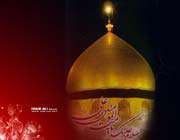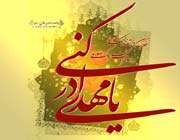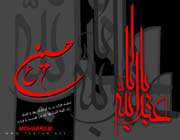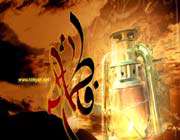| |
In hospital:
After a year of financial success and ‘high’ living, I became very ill, contracted T.B and had to be hospitalized. It was then that I started to think; what was to happen to me? Was I just a body and my goal in life was merely to satisfy this body?
I realized now that this calamity was a blessing given to me by Allah a chance to open my eyes, ‘why am I here, why am I in bed’, and I started looking for some of the answers. At that time there was great interest in the Eastern mysticism I began reading and the first thing I began to become aware of was death, and that the soul moves on, it does not stop. I felt I was taking the road to bliss and high accomplishment I started meditating and even became a vegetarian. I now believed in ‘peace and flower power’, and this was the general trend. But what I did believe in particular was that I was not just a body, this awareness came to me at the hospital.
One day when I was walking and I was caught in the rain. I began running to the shelter and then I realized, ‘wait a minute, my body is getting wet, my body is telling me I am getting wet’. This made me think of a' saying that the body is like a donkey and it has to be trained where it has to go otherwise the donkey will lead you where it wants to go.
Then I realized I had a will, a God given gift; follow the will of God I was fascinated by the new terminology I was learning in the eastern religion. By now I was fed up with Christianity. I started making music again and this time I started reflecting my own thought. I remember the lyric of one of my songs. It goes like this :’ I wish I knew, I wish I knew what makes the heaven, what makes the hell, Do I get to know you in my bed or some dusty cell while others reach the big hotel?’ and I knew I was on the Path.’
I also wrote another song ‘The way to find God out.’ I became even more famous in the world of music. I really had a difficult time because I was getting rich and famous and at the same time sincerely searching for the truth. Then I came to a stage where I decided that Buddhism is alright and noble, but I was not ready to leave the world, I was too attached to the world and was not prepared to become a monk to isolate myself from society.
I tried Zen and ching, numerology, treat cards and astrology, I tried to look back into the Bible and could not find anything. At this time I did not know anything about Islam and then, what I regarded as miracle occurred. My brother had visited the mosque in Jerusalem and was greatly impressed that while on the one hand it throbbed with life (unlike the churches and synagogues which were empty); on the other hand, an atmosphere of peace and tranquility prevailed.
By Yusuf Islam (Cat Stevens)
Source: al-shia.org

All I have to say is all what you already know, to confirm what you already know about the message of the prophet (PBUH) as given by God – the religion of Truth. As human beings we are given a consciousness and a duty that has placed us at the top of creation. Man is created to be God’s deputy on earth and it is important to realize the obligation to rid ourselves of all illusions and to make our lives a preparation for the next life, anybody who misses this chance is not likely to be given another, to be brought back again and again, because it says in the Holy Qur’an that when man is brought to account, he will say, ‘O lord, send us back and give us another chance. The Lord will say, if I send you back you will do the same.
My early religious upbringing:
I was brought up in the modern world of all the luxury and the high light of show business. I was born in a Christian home but we knew that every child is born in his nature, it is only his parents that turn him to this or that religion I was given this religion (CHRISTIANITY) and thought this way. I was taught that God exists, but there was no direct contact with God, so we had to make contact with him through Jesus, he was in fact the door to God. This was more or less accepted by me, but I did not swallow it all.
I looked at some of the statues of Jesus; they were just stones with no life” And when they said that God is three, I was puzzled even more but could not argue. I more or less believed it, because I had to have respect for the faith of my parents.
Pop Star:
Gradually I became alienated from this religion upbringing, I started making music. I wanted to be a big star. All those I saw in the films and on the media took hold of me, and perhaps I thought this was my God, the goal of making money I had an uncle who had a beautiful car :Well:, I said , “ he has it made,” he had a lot of money. The people around me influenced me to think that this world was their God.
I decided then that this was the life for me, to make a lot of money, have a “great life “. Now my example were the pop stars, I started making songs, but deep down I had a feeling for humanity, a feeling that if I became rich I will help the needy (it says in the Qur’an, we make a promise, but when we make something we want to hold on to it and become greedy).
So what happened was that I became very famous, I was still a teenager, my name and photo were splashed in all the media. They made me larger than life, so I wanted to live larger than the life and the only way to do that was to be intoxicated (with liquor & drugs).
By Yusuf Islam (Cat Stevens)
Source: al-shia.org

The March to Khaybar
The truce the holy Prophet had made with Mecca now made it possible to concentrate on the dangers which lay to their north. The greatest of these was the town of Khaybar, occupied by Jews who were for the most part implacably hostile to Islam.
The sorcerer Labid had almost certainly been bribed from there, though that could have been the work of an individual. But there were far more evident and general reasons for taking action against the exiled Bani Nadir and their Khaybarite kinsmen. Not that they were likely to invade Yathrib.
Except for one or two men, they had not taken any direct part in the campaign of the Trench, but it was they who had given Quraysh every encouragement to attack, and it was their influence which had induced their allies of Ghatafan to side with Quraysh on that occasion.
It was also largely through them that Ghatafan still remained virtually at war with the oasis. Medina could never know any fullness of peace while Khaybar remained as it was.
It had long been clear that something must be done, sooner or later, in that direction; and now the time had come, for the Prophet was certain that the near victory promised in the recent Revelation - a victory which would moreover be rich in spoils - could be nothing other than the conquest of the Jewish stronghold of Khaybar.
But this was not to be shared by all who professed Islam. The Revelation made it clear that those Bedouin who had failed to respond to his summons to make the Lesser Pilgrimage had been largely prompted by mercenary motives.
Since there was no hope of plunder on the Pilgrimage, it was not worth the effort. They were therefore not to be allowed to take part in the conquest of what was, without doubt, one of the richest communities in all Arabia.
This meant setting off with a smaller force, though it had the advantage that their plans could be kept secret until the last moment. But even when the project became known, it was passed from mouth to mouth as a pleasantry rather than a fact. The impregnable strength of Khaybar was almost proverbial.
Quraysh and the other enemies of Islam hoped that the news was true because, if so, Mohammad would at last receive a crushing defeat; but they feared it could not be true, for they knew he was not mad.
As for the men of Khaybar themselves their confidence was such that they refused to believe it. They did not even trouble to ask their allies for help until certain news came from Medina that Mohammad was about to set forth.
Only then did Kinanah, their virtual chief, make a speedy visit to Ghatafan, offering them half the date harvest for that year if they would send them reinforcements. The Ghatafan agreed to do so and promised a force four thousand men.
The Jews of Khaybar were in the habit of donning their armour every day and lining up their full strength of fighting men, ten thousand in all. The help of Ghatafan would bring the number up fourteen thousand; and according to the news from Medina, the invading army was of sixteen hundred men only.
Before the Prophet set out, one of the men of Aws known as Abu Abs came to him with a problem. He had a camel to ride, but his clothes were rags and he had no means of procuring any provisions to take on the march and nothing to leave for the upkeep of his family, let alone buying himself new garment.
There were many others in similar circumstances, though this was an extreme case. But much had been spent on the Pilgrimage, and everything that had been gained so far in the way of spoil was outweighed by the increasing number of poverty-stricken converts who came Medina from every direction.
The Prophet gave Abu Abs a fine long cloak all that was available for the moment; but on the march, a day or two later he noticed that he had on a much poorer cloak and he asked him:
"Where is the cloak I gave thee?"
Abu Abs replied,
"I sold it for eight dirhams. Then I bought two dirhams worth of dates as provision for myself, and left two dirhams for my family to live on, and bought a cloak for four dirhams."
The Prophet laughed and said:
"O father of Abs, thou and thy companions are poor indeed. But by Him in whose hand is my soul, if ye keep safe and live yet a little while, ye shall have abundance of provision and leave abundantly for your families. Ye shall abound in dirhams and slaves; and it will not be good for you!"
At one point on the march, between two camps, the Prophet halted army and called to a man of Aslam known as Ibin Al-Akwa, who had, as he knew, a beautiful voice.
"Dismount, and sing us a song of camel songs."
The Bedouin would sing to their camels as they rode from place to place. They would chant poems to old melodies, monotonous, haunting and plaintive; and to the sadly serene cadences of one of these Ibin Al-Akwa now chanted some words which the Prophet had taught the while they were digging the trench:
"God, but for Thee we never had been guided, Never had given aims, nor prayed Thy prayer."
So it began; and when he had finished the Prophet said to him:
"God have Mercy on thee."
One of the companions noted:
"Thou hast made it inevitable, O Messenger of God. Would thou hadst let us enjoy him longer!"
He meant, as they all knew, that the Prophet had foretold his early martyrdom, for they had come by experience to conclude that when he invoked Mercy upon anyone, that person had probably not long to live.
Source: alhassanain.com

Sauda Hamdani is a lady fond of Ali. She in presence of Mo’awiyah paid salutation to Ali and described his merits: "Blessed is the soul who has been hurried and with him justice has been buried. He was so committed to truth that no other heart could do. He was conjoined with faith and belief. Saasaa bin Sohan Abdi is another devotee of Ali. He is from amongst those who joined Ali’s funeral on the fateful night. When they burried Ali and heaped dust on his body, Saasaa put one of his hands on his heart and threw dust on his head with the other, saying, "Death be happy to you! You were born in pious premises. Your perseverance was vigorous, your efforts were marvelous. You had control on your thoughts and your bargain was profitable".
"You have reverted back to your Creator and He has happily welcome you. His angels have rallied around you. You have resided in the proximity of the Prophet. Allah has brought you closer to Himself and has put you in the vicinity of your brother Mustafa. He has made you drink from his cup".
"I wish Allah may grace us to follow you and trace your footsteps. We should keep your fiends to be our friends and your enemies to be our enemies and may be we are resurrected among the company of thy friends".
"You discovered what others could not. You reached where others could not. In the view of thy brother, the Prophet, you have battled. With Allah’s Faith you stood fast in a befitting manner up to enforcement of Sunnah, eradication of opposition to it and establishment of Faith. Best salutations to you.
"Through you the Muslims were fortified, their ways became clear and Divine commands were enforced. No single person would ever possess all those merits and charms which you singly possessed. You were responsive to the Prophet’s call. You were foremost among others to receive Prophet’s approval. You hastened to his assistance. You defended him at the risk of your life. In the moments of dread and horror you assaulted with your sword, The Zulfiqar, and broke the aggressor’s spinal cord. You uprooted idolatry and meanness. You dragged the transgressor through sand and blood. May you rest in peace, O the leader of the faithful!"
"You were nearest to the Prophet. You were the first to embrace Islam. You were full of confidence. You were of the firm mind. You were rich in virtue. May God not deprive us of our reward for our missing you. May He not abandon us after you".

"By God! Thy life was key to virtue and lock to vice. Thy death is key to every vice and lock to every virtue. Had the people benefited from you, blessings would have showered on them from heavens. But they preferred the sordid world".
Yes they preferred the sordid world. They could not face justice and Ali’s determination. Ultimately rigidity and stagnation came out of the sleeves of such a people and they martyred Ali.
Ali is matchless in having such friends and selfless devotees who laid down their lives in the cause of his love and affiliation. They marched even to the gallows. The pages of Islamic history are proud of their blossoming, beautiful and marvelous biographies. Hands of the ignoble criminals like Ziyad, son of unknown, his son Obaidullah, Hajjaj bin Yusuf, Mutawakkil and, above all, Mo’awiyah bin Abi Sufian are soaked to elbow of the blood of such a cream of humanity.
Source: the book named, The Attraction and Repulsion of Ali (A.S)
By Mortaza Motahhari

What is the cause of Ali’s love and affection in hearts of men? The secret of love has not till today been discovered by anyone. It is not possible to evolve a formula saying that had it happened so this would have been the result and had it happened the other way that would have been the result. However, it has a secret. There is something in the beloved, which attracts the lover and is bewitching for him. The love and attraction in the foregoing chapters has been named as "Ishq". Ali no doubt is the beloved of and coveted by men. Why? And to what end? Why this is exceptional with Ali that he inspires love and allures the souls to himself. Why has he become a perpetual phase and why does he live to eternity? Why do the hearts feel that they are acquainted with him? Why did people not feel that he is dead and it is why that they find him alive?
Admittedly the object of love is not his body because he is not bodily present amongst us and we do not feel him as such. Moreover, love with Ali is not equivalent to hero-worship of all nations. It will be doubtful if we say love with Ali is sequel to love with his human and moral merits and that love with Ali is love with humanity. Doubtless, Ali is an embodiment of a perfect man. It is also correct that man loves great models of human virtue. But let Ali possess all these human merits, let him possess wisdom, knowledge, devotion, sacrifice, humility, decorum, kindness, affection, love for the weak, justice, freedom, independence, regard for humanity, selflessness, chivalry, bravery and kindness even towards his enemy; (and according to Maulvi: you are in chivalry, the Lion of Allah; We cannot define what you are in benevolence), generosity, benevolence, and all that Ali had let him have; if he would not have enjoyed the complexion of God, he would not have been so much captivating and inspiring as he is even today.
Ali is loved because he has connection with Divinity. He, imperceptibly, from the depths of our hearts attracts us towards the Truth and towards determination. And when we say Ali is one of the greatest signs of Allah, it is for the reason that we find in him the manifestation of Truth. Hence men’s love for him.
In fact what reinforces people’s love with Ali is the bondage of love of God hidden in their souls. As the souls are eternal, so is love for Ali. There are so many brilliant points in Ali’s personality, but what is always sublime and illuminating is his faith and sincerity, which has blessed him with Divine determination.
Source: A book named The Attraction and Repulsion of Ali (A.S)
By Mortaza Motahhari

Proposal of Mubahila
After exchange of views on several issues, the delegation did not seem to be willing to accept the observations about the incorrect beliefs of Christianity and the logical explanations proving the incorrectness of their beliefs. At that time Allah send down the famous Ayat-e-Mubahila of the Quran:
Glorious Quran Chapter 3 Verse 61:
And unto him who disputeth with thee therein after the knowledge hath come unto thee, Say! (O\" Our Apostle Muhammad!) (Unto them) come ye, let us summon our sons, and (ye summon) your sons, and (we summon) our women and (ye) your women, and (we summon) ourselves and then let us invoke the curse of God on the liars!
Prophet Muhammad (pbuh) recited this Ayat and invited them for Mubahila - praying to God to destroy and banish the liars.
Mubahila became necessary since the Christian delegation was adamant to accept the truth. After some hesitations the delegations asked to be given one day to reconsider their options and then accepted to have the Mubahila after two days. In their consultations among themselves, the grand Bishop Abu Harisa told his companions that if tomorrow, Prophet Muhammad (pbuh) brings his companions and his tribesmen and military might with him for Mubahila then they should accept the challenge without fear but if he brings only the members of his family, then never accept the challenge.
Whom did the Prophet (pbuh ) take with him?
The Prophet Muhammad (pbuh) selected a place close to Medina for the Mubahila which was then cleaned and prepared by Salman Farsi and the next day the Christian delegation reached the designated place. A number of muhajirren and ansaar also gathered at the site. The Holy Prophet Muhammad (pbuh) took with him Imam Hassan (a.s), Imam Hussein (a.s), Bibi Fatimah (s.a) and Imam Ali (a.s) and headed towards the site in a manner that Prophet Muhammad (pbuh) was leading the group holding Imam Hassan (a.s) and Imam Hussein (a.s) and Bibi Fatima (s.a.) was behind him and Imam Ali (a.s) was behind Bibi Fatima (s.a).
Saad bin Abi Waqas relates that when the Ayat-e-Mubahila was sent down, Prophet Muhammad (pbuh) called Imam Ali (a.s), Bibi Fatimah (s.a), Imam Hassan (a.s) and Imam Hussein (a.s) and said \’O my Allah, these are my Ahl-ul-Bayt\’. (Sahih Muslim, Vol.2, Page 287).
Prophet Muhammad (pbuh) sat down under a tree with these weighty personalities and said that when I pray to God, you all should say \'Ameen\'.
When the Christian delegation saw a woman, two children and only one man with the Prophet (pbuh), they got scared and worried and Abu Harisa said \’O my Christian friends, I am seeing such bright faces that if they pray that God move this mountain from its place then the mountain will be moved. I warn you do not have Mubahila with them or you all will be destroyed and banished.\’
The Christian delegation was still amazed and frightened when the brother of Abu Harisa, Karz ibn-e-Alqama stated that \’O my fellows, it appears that Muhammad (pbuh) is the same last apostle and prophet that has been mentioned in our sacred books. We should not have Mubahila with them because anyone who had Mubahila with the prophets in the past as well were destroyed. Look around you and observe that the signs of your destruction are appearing.\’ When they looked around, they observed that the entire atmosphere had changed and it appeared that a furious storm is in offing.
Result of the Mubahila
Witnessing this, they backed off from the contest and requested that their friendship be accepted. Prophet Muhammad(pbuh) accepted their request and asked Imam Ali(a.s) to write the agreement according to which they Najran tribes accepted to pay \'Jazia\' and live under the protection of the Muslims.
This victory is a unique one in the history of this world.
Source:duas.org

The 24th of Zil-Hajj marks the anniversary of the auspicious occasion of Eid Mubahila. This is the day of victory of Muslims over Christians. The event of Mubahila occurred in the 10th of Hijrah.
Najran was a fertile land located in the Northern mountainous region of Yemen about 20 Kms from Sanaa. About 40,000 Christians inhabited the land divided into 73 small towns. They were idol worshipers historically just like the Arabs but a priest named Femeon, a constructor by profession, preached Christianity in the area of Najran and soon all the population converted to Christianity and Najran became a powerful center of activities of Christians. They also constructed a church and named it \'Kaba-e-Najran\'. They prayed and offered various offerings there which resulted in an annual income of about two hundred thousand Dinars which was used for the priest who lived and studied there.
After the conquest of Mecca when Islam started spreading rapidly and the warring groups came under the flag of Islam, the Holy Prophet (pbuh) starting sending emissaries to the tribes who had not yet accepted Islam. In 10 A.H. a similar message was sent to the Christians of Najran and they were offered either to accept the teachings of Islam or live in the protection of Muslims and give \'Jazia\' - a kind of fee for protection services. When the Bishop of Najran received this message, he invited all the scholars and influential people of Najran and asked them to think and find a solution to this situation. This news spread rapidly among the masses and some people got infuriated as well but the Bishop of Najran pacified them and advised them to be mindful of the military might of the Islamic regime and try to find a peaceful solution.
Christian mission heads to Medina
After deliberations, it was finally decided to send a mission to Medina and have a dialog with the Muslims. A 14 member delegation headed by Aqib Saidawar and Abu Harisa started off for Mecca. Abu Harisa was considered as the greatest Bishop and scholar of the Christian world at that time and Aqib Sadawar was the biggest strategist and negotiator of the time. When the delegation reached Medina, the people got impressed by their lavish dressing and pomp and show since it was the first time that a mission had arrived in such a manner.
When they entered the Al-Masjid al-Nabawi, The Prophet Muhammad (pbuh) looked at the precious stones, gold and silk clothes that they were wearing and turned away his face and did not pay any attention to them. After a while when no one noticed their pomp and show, they got out of the Al-Masjid al-Nabawiand met Usman and Ubaid-ur-Rehman outside and asked them as to why they were invited by the Muslims and then treated in this manner. Usman mentioned that he did not have a clue about that but if they consult Imam Ali(a.s), he would be able to tell them what was going on. They took the delegation with them and arrived at the house of Imam Ali (a.s) and mentioned about the whole incidence to him.
Imam Ali (a.s) said to the delegation that they were wearing dresses of silk and ornaments of gold which depicted their superior mentality and that they should take them off and dress simply.
Only then the Prophet (pbuh) would allow them to visit him and entertain them. when they followed the instructions of Imam Ali (a.s), they were allowed to visit the Prophet Muohammad(pbuh) after the Prayers of Asar and have discussions with him.
Source: duas.org

When writing about the greatness of a personality, one needs a gold standard with which to compare the strengths and weaknesses of that individual. However, if that person is herself the gold standard, then it makes it impossible to adequately describe her greatness. Hazrat Fatimah (s.a) was such a personality. Her merits are unmatched by any woman known in history and Allah himself testifies in the Qur’an about her purity and piety.
It is related that Imam Jafar Sadiq (a.s) said: “Fatimah has nine names near (to) Allah, they are: Fatimah, As-Siddiqah (the honest), Al-Mubarakah (the blessed one), Taherah (virtuous), Zakiyah (the chaste), Radhiyatul-Mardhiah (who is gratified and shall be satisfied), Muhaddathah (the one to whom angels speak), and Zahra (the splendid.)
I will quote a few passages from the introduction of the Book titled “Fatimah the gracious” by Abu Muhammad Ordoni, the Jordanian scholar:
“Fatimah is a female created by Allah to be a sign of His marvelous and unprecedented Might.
For, the Almighty Lord created Muhammad (PBUH) as a sign of His among the Prophets; and created from him a daughter, Fatimah, to be a Sign of His ability to create a female possessing all moral excellence and talents. In fact, Allah the Almighty bestowed Fatimah with a vast share of greatness and high level of majesty, which no other woman can ever claim to have reached.
She is one of the prominent people close to Allah, whose greatness was acknowledged by the Heaven before the creation of mankind; and in whose regard verses from the Qur’an that are (being read) and will be read day and night until the day of resurrection, were revealed.”
Fatimah’s (s.a) genius is considered an example of a Muslim woman’s adherence to noble traits. She is a perfect example of how a daughter, a wife, and a mother should act while keeping her decency and pure character.
She also shows us the Muslim women’s role in social fields within the limits of religion and virtue. Her life confirms that Islam does not deprive women of acquiring scientific, cultural and literary knowledge;”
The merits of Hazrat Fatimah (s.a) are many. Numerous verses in the Qur’an are revealed in her praise. Some of the well known verses in the Qur’an in praise of the Ahl-ul-Bayt, including Fatimah (s.a) are these:
1. Verse of Mubahila. Chapter 3: v.61
2. Verse of Purity. Chapter 33: v.33
3. Verse of Muwaddat. Chapter 42: v. 23
4. Verses of Surah Ad-Dahr. Chapter 76

76- One scholar is better than one thousand worshippers, one thousand ascetics, and one thousand hard-working persons in worship.
77- Everything has its tax and the tax of knowledge is to teach its people.
78- Judges are four categories three of whom will be in Hell while one only will be in Paradise. The judge who judges unjustly intentionally will surely be in Hell. The Judge who judges unjustly inadvertently will be in Hell. The Judge who judges unjustly inadverently will be in Hell. The judge who judges justly but unintentionally will be in Rell. The judge who judges justly intentionally will be in Paradise.
79- Imam As-Sadiq(a.s) was asked about the character of decency. The Holy Imam(A.S.) said: The decent is that who turns his sight away from the forbidden views, holds up his tongue from the ill wording, and abstains from oppressing others.
80- Allah will not ask people about things that are screened from them before He identifies them.
81- To put your hand to the elbow between the jaws of a dragon is better than asking those who have got newly fortune.
82- The settlement of needs is Allah's, but the ways are in the people' hands. You should thank Allah for the settlement of your needs, and you should submit, accept, and tolerate if they are not settled. Unsettlement of a need may be for your good. Allah knows your good while you do not know.
83- A man's begging from another man is an ordeal: if he gains what he asked for he will then thank the one who did not give him and if he is refuted, he will censure the one who did not refute him.
84- Allah has installed the whole goodness in leniency and courtesy.
85- Beware of associating with the lowly, because the association with them will never lead to welfare.
86- As a man worries about a little humility, this may engage him into a greater one.
87- The most advantageous thing is to precede people to the recognition of your own flaws. The heaviest thing is to hide your poverty. The less fortunate thing is to provide the advice to him who refuses it and to live next to an acquisitive individual. The most relaxing thing is to despair of people's giving. Never be weary of obscure. Be modest by submitting to the opinions of him who is higher than you (in rank) and who did you favors when such opinions oppose yours. You have submitted to his being higher than you so as to avoid disagreeing with him. He who does not submit to anybody's favor is surely self-conceited. You should know that he who does not humble himself before Allah will never gain pride and he who is not modest before Allah will never gain haughtiness.
88- To wear rings on the fingers is a prophetic tradition.
89- The most favorable friend to me is that who shows me my flaws.
90- Friendship is nil unless its limits are kept. He who does not keep these limits should not be regarded as friend. The first limit is that the inner self and the appearance should be identical. The second limit is that the friend should regard your goodness as his goodness and your evil as his evil. The third limit of friendship is that a position or fortunes should not change the friend's relation with his friends. The fourth limit is that the friend should not deprive his friend of anything that he is capable of doing. The fifth limit--which is the most comprehensive--, is that the friend should never leave his friend alone in calamities.
91- Comity is one third of the mind.
92- The believers' laughter should be only a smile.
93- There is no difference between depositing a trust with a betrayer or a negligent.
94- Imam As-Sadiq(A.S.) said to Al-Mufaddal: I instruct you to stick on six characters and relate them to my adherents-Shia. You should fulfill the trust of him who entrusts you with anything. You should like for your brother whatever you like for yourself. You should know that every matter has an end; therefore, you should beware of the outcomes of matters. Similarly, every matter has a sudden event; hence, beware of the sudden events. Beware of climbing an easy mountain if its slope is uneven. Never promise your brother of a matter that you cannot fulfill.
95- Allah has not permitted people in three matters: they should treat the parents kindly whether they are righteous or wicked, abide by the pledge whether to the righteous or the wicked, and fulfill the trust whether to the righteous or the wicked.
96- I feel sympathetic to three classes of people. Anyhow, they should be treated mercifully. They are those who suffered humiliation after honor, those who became needy after having been wealthy, and the scholars whom have been belittled by their folks and the ignorant people.
97- He whosever heart is attached to the fondness of this world will be suffering three matters-an everlasting care, an unattainable hope, and an unachievable expectation.
98- Lying and treachery are not within the ethics of the believers. Two characters are not found together in the hypocrites: they are good-looking and understanding of a tradition.
99- People are equal like the teeth of a comb. With the support of his brothers, a man can be regarded as great. No goodness is expected in the friendship of those who do not like for their friends whatever they like for themselves.
100- Understanding is the ornament of faith, self-possession is the ornament of understanding, kindness is the ornament of self-possession and easiness is the ornament of leniency.
Source: alhassanain.com

51- As for those who practice without guidance, they are like him who walks without choosing a definite path. The more he walks, the remoter he becomes.
52- The meaning of Allah's saying, "Have fear of Allah as you should be, (Holy Qur'an 3:102) is that Allah should be obeyed in such a way that He should not be disobeyed, mentioned in such a way that He should not be neglected, and thanked in such a way that He should not be shown ingratitude.
53- He who recognizes Allah accurately will fear Him. He who fears Allah accurately will disregard the worldly pleasures.
54- The actual fearful is that who cannot speak due to the intensity of fear.
55- Imam As-Sadiq(A.S.) was asked about the manners of some people who were committing the acts of disobedience to Allah and claiming that they were desiring for the mercy of Allah and kept on doing so until death attacks them.The Holy Imam(A.S.) said: As for those who act disobediently and claim expecting Allah's mercy until they die, they are rocking on hopes. They are surely liars. They do not expect Allah's mercy. He who expects something should seek it. Likewise, he who fears something should escape it.
56- We love those who are intelligent. knowledgeable, perceptive, expert, clement, courteous, patient, veracious, and loyal. Allah gave the noble characters exclusively to the prophets(a.s). He who enjoys such characters should thank Allah for them. He who does not enjoy them should supplicate to Allah for them. As he was asked about these noble characters, Imam As-Sadiq(A.S.) said: The noble characters are piety, satisfaction, patience, gratefulness, clemency, pudency, generosity, bravery, enthusiasm, veracity, charity, fulfillment of the trusts, conviction, good mannerism, and chivalry.
57- The firmest handle of faith is to love, hate, give, and deprive-all for Allah's sake.
58- Nothing will follow a dead person except three things: an alms that Allah gave permanetly in his life and it will follow him after death, a norm of guidance that others pursue, and a virtuous son that supplicates to Allah for his favor.
59- Lying invalidates the ablution (for the prayers) and breaks the fasting. The attendants said: But we use to tell lies." The Holy Imam(A.S.) said: I do not mean lying due to garrulity, but I mean forging lies against Allah, His Messenger, and the Imams(A.S.). The Holy Imam (A.S.) then added: Fasting is not abstaining from food or drink only. Mary(A.S.) said, -as the Holy Quran reported- "I have promised the Beneficent Allah to fast. (Holy Qur'an19:26) This means to keep silent. Thus, you should keep silent, turn the sights away (from whatever Allah has forbidden), and stop envying and disputing with each other. Envy consumes the faith like the fire when consumes the wood.
60- The Divine Throne will be shaken when one makes Allah the witness of a false matter.
61- Allah knew that sin is better for the believer than self-conceit lest, Allah will never test the believers through the commitment of sins.
62- He whose conducts are bad is tormenting himself.
63- Favor is well-known. Except its reward, nothing is better than doing favor.
64- Nothing like thanks in increasing the favorable matters and nothing like patience in decreasing the unfavorable matters.
65- The most effective soldiers of Eblis are women and rage.
66- The world is the believer's jail, patience is his fortress, and Paradise is his abode. The world is the disbeliever's paradise, grave is his jail, and Hell is his abode.
67- Allah has not created doubtless conviction that is more similar to unspoiled doubt than death.
68- Whenever you see a servant (of Allah) pursuing people's flaws and neglecting his own flaws, you should then realize that he has been trapped (by the Shaitan).
69- The server of food who thanks (Allah for so) will be rewarded as same as those who fast just for gaining the rewards of Allah, and the individual who is cured and thanks (Allah for curing him) will be rewarded as same as the diseased one who is steadfast against that disease (for the sake of Allah).
70- Those who are not scholars should not be regarded as happy, those who are not amiable should not be regarded as laudable, and those who are not tolerant should not be regarded as perfect. Those who do not guard themselves against the scholars' blame and censure should not be expected to gain the welfare of this world and the world to come. The intelligent should be veracious and thankful so that their sayings will be trusted and they will be given increasingly.
71- You should not trust the betrayer after you had tested him and you should not accuse him whom you trusted.
72- Imam As-Sadiq(A.S.) was asked about the people who are most respected by Allah. He answered: The people who are most respected by Allah are those who mention and obey Him more than the others. He, then, was asked about the people that are most disrespected by Allah, Imam As-Sadiq(A.S.) answered: The people that are most disrespected by Allah are those who accuse Him. "Is there anyone who accuses Allah?" I asked. The Holy Imam(A.S.) said: He who seeks Allah's decision and dissatisfies himself with it when it comes opposite to his will is accusing Allah." "Who else?" asked I. The Holy Imam(A.S.) answered: Then come those who complain against Allah." "Is there anyone who complains against Allah?" I asked. The Imam(A.S.) said: They are those who exaggerate in complaining about the misfortunes that they are suffering." Who else?" asked I. He(A.S.) answered: Then come those who neglect showing gratitude when they are endowed with a grace and show intolerance when they are inflicted by a problem." "Who are the most respected by Allah?" asked I. He(A.S.) answered: The most respected people are those who show gratitude when they are given a grace and treat with their problems tolerantly.
73- The weary are friendless and the envious are fortuneless. Much looking into wisdom pollinates the mind.
74- Fear of Allah is sufficient knowledge and deceit is sufficient ignorance.
75- The best adoration is to know Allah and behave humbly with Him.
Source: alhassanain.com

26- To miss a need is better than asking it from other than its people. Bad mannerism in a misfortune is more catastrophic than the misfortune itself.
27- As a man asked him a short item of instruction that collects the welfare of this world and the world to come, the Holy Imam (A.S.) said: Never tell untruths.
28- Imam As-Sadiq (A.S.) was asked about eloquence. He answered: Eloquence is to express the idea in as few as possible words. The eloquent is that who attains his demand in the least effort.
29- Debt is grief at night and humility in day.
30- If your worldly demands are attainable, you should check your religion.
31- Treat your fathers piously so that your sons will treat you piously. Keep yourselves away from the strange women so that your harem will be chaste.
32- He who entrusts a betrayer with a deposit will be deprived of Allah's warranty.
33- Imam As-Sadiq(A.S.) said to Humran-bin-A'yun: O Humran, look to him who is less powerful that you are and do not look at him who is more powerful so that you will be more satisfied with what Allah has allotted for you and will be a greater motive to deserve the Lord's increase. Know that little permanent deed with conviction is more favorable to Allah than the many deeds that are lacking conviction. You should know also that no piety is more profitable than avoiding committing the prohibited matters and the abstinence from harming and backbiting the believers. No living is more pleasant than good mannerism, no fortune is more advantageous than satisfaction with the sufficient and the little, and no ignorance is more harmful than self-conceit.
34- Pudency is of two faces: one is weakness while the other is power, submisison, and faith.
35- Negligence of others' rights is humility. Certainly, the neglector of rights needs for forgery in this regard.
36- It is sufficient for one of the group to salute. Similarly, it is sufficient for one of the group to respond the salutation.
37- Salutation is voluntary while responding is obligatory.
38- Do not answer those who speak before they greet you.
39- Shaking hands is the perfect greeting of the resident and embracement is the perfect greeting of the traveler.
40- Shake hands, because this will confiscate malice.
41- Fear Allah even if to some extent. Construct a screen between Him and you even if transparent.
42- As for those who control themselves in rage, desire, fear, and lust, Allah will prevent Hell from burning their bodies.
43- Good health is a light grace; it is forgotten when found and mentioned when missed.
44- In good days, Allah endows with the grace of consent. In distress, He endows with the grace of purification.
45- It often happens that Allah endows a servant with a grace that he does not expect. It also happens that one hopes for something while his goodness is in its opposite. It also may happen that one is running for his doom, while he goes slowly for his goodness.
46- He who does not show steadfastness against every misfortune, show gratitude for every grace, and show easiness for every complexity will surely be too short to continue. Be broad-minded whenever a misfortune inflicts you, whether in your son, wealth, or other matters. The fact of every misfortune is that Allah receives his loan and takes his gift back so as to test your tolerance and thanking.
47- Everything has limits. The limit of conviction is not to fear anything besides Allah.
48- The (Faithful) believer should enjoy eight characters; he should be venerable in shaking situations, steadfast against misfortunes, thankful in luxury, satisfied with what Allah has decided to him, avoid oppressing the enemies, avoid overtasing the associates, should fatigue his body, and make people feel glad with him.
49- Knowledge is the comrade of the faithful believer, clemency is his supporter, patience is the commander of his army, lenience is his brother, and charity is his father.
50- Imam As-Sadiq(A.S.) said to Abu-Ubayda who asked him to supplicate to Allah for saving him from making his earnings pass by the mediation of the servants: Allah has arranged to make people's earnings in other people's hands. You should supplicate to Allah to make your earnings in the hands of the charitable people, because this is a sort of happiness, and not to make your earnings in the hands of the vicious, because it is a sort of despondency.
Source: alhassanain.com

By: Saira Hussain
Rabi-ul Awwal 17 is the birth anniversary of holy Prophet Hazrat Muhammad (SAWW) and his sixth infallible descendant Hazrat Imam Jafer As-Sadiq (AS). Here is a little collection of some maxims of the Imam (AS):
1- He who treats people kindly will be accepted as arbiter.
2- To trust everybody in times of injustice and cheating is disability.
3- If problems are added to each other, they will give birth to relief.
4- To recognize the actuality of your friend, you should enrage him. If he keeps up his friendship, he is true friend lest, he is false.
5- Do not appreciate one's affection before you enrage him three times.
6- Do not trust your friend perfectly, because the knockdown of the trustful is incurable.
7- Islam is a definite rank. Faith is one rank higher than Islam. Conviction is one rank higher than faith. People have been given a rank lower than conviction.
8- To remove a mountain is easier than removing faith.
9- Beware of joking, because it causes rancor and drives into malice. Joking is the lesser revilement.
10- The desire for the worldly pleasures causes grief and sadness. Abstinence from the worldly pleasures brings about the rest of both heart and body.
11- Life is to rent a house and buy bread.
12- He who gains oppression is not gaining welfare. He who mistreats people should not complain when people mistreat him.
13- In homelands, exchanging visits is the means of association. In travel, correspondence is the means of association.
14- A believer is not perfectly virtuous unless he enjoys three characters-- knowledgeability of the religious affairs, moderation in living, and steadfastness against misfortunes.
15- An actual believer is that whose sexual appetite does not overcome him and whose stomach does not shame him.
16- A twenty-year friendship is kinship.
17- Favors should be done only to the highborn or the religious. Those who show gratitude are very few.
18- Enjoining good and forbidding evil should be practiced with a faithful believer that he would learn a lesson, or an ignorant that he would earn. Enjoining good and forbidding evil become surely worthless when they are applied to the powerful tyrants.
19- Those who enjoin good and forbid evil should enjoy three characters: they should be aware of the matters that they enjoin and the matters that they forbid,fair in the matters that they enjoin and the matters that they forbid, and lenient in the matters that they enjoin and the matters that they forbid.
20- He who suffers a misfortune due to obtruding upon an unjust ruler will be neither rewarded nor endowed with patience.
21- As some people showed ingratitude for Allah's graces, He changed the graces into crises. As other people showed steadfastness against the misfortunes that inflicted them, Allah changed the misfortunes into graces.
22- The prosperity of coexistence and association are three thirds: two thirds are acumen and one is overlooking.
23- Revenging on the pauper is extremely ugly.
24- Imam As-Sadiq(A.S.) was asked about personality, he answered: Personality stands for that Allah should not see you in situations against which He warned, and miss you in situations of which He ordered.
25- Thank him who did you favor, and confer upon him who thanked you. Graces that are shown gratitude will not be removed while those that are shown ingratitude will not persist. Thanks increase the graces and saves against poverty.
Source: alhassanain.com

When writing about the greatness of a personality, one needs a gold standard with which to compare the strengths and weaknesses of that individual. However, if that person is herself the gold standard, then it makes it impossible to adequately describe her greatness. Hazrat Fatimah (s.a) was such a personality. Her merits are unmatched by any woman known in history and Allah himself testifies in the Qur’an about her purity and piety.
The rest of the text in the next page...(ادامه مطلب)
ادامه مطلب...

Introduction
During their missions, all the Prophets and Apostles have emphasized the fact that a savior will arrive at the end of time who will implement the government of justice over the globe. This news has been heard since the human being appeared on the earth. Allah has indicated this promise in all the early scriptures and commanded humans throughout ages to wait for the manifestation of the kingdom of Allah. The Holy Qur’an also gives glad tidings of the day for ...
The rest of the text in the next page... (ادامه مطلب)
ادامه مطلب...

We also learn from Fatimah (A.S.), in her advanced missionary awareness and position, that she was someone who rebelled against her personal needs, however simple, for the sake of her missionary ambitions; she was someone who prioritized in favour of principles over the self. This is what we need to learn, for many of us - men and women alike - fall down when it comes to a choice between the needs of the principle and the needs of the self; we too often choose the self, and may even make a principle of service to the self.
Fatimah al-Zahra (A.S.) was unique in all her behaviour and deeds, even in her sorrow for her beloved, especially during her separation from the Messenger of Allah (PBUH).
Historians tell us that, when she went to him as he was dying, she embraced him and he whispered something in her ear which made her weep. Then, when he whispered something that made her laugh, she was asked:
'How quickly (your) laughing after weeping?!' She said: 'I shall not reveal the Messenger of Allah's secret in his life.' So, when she was asked about this after his death, she said: 'He whispered in my ear first that he was going to meet his Lord and that his soul was announced to him (his death), so I wept; then he whispered in my ear again that I was going to be the first of his family to go after him, so I laughed!'
Where else would you find a young woman, whatever her love for her father, become happy when he tells her that she is going to be the first to die after him?
What relationship deeper could be than this, and what unity of spirit could be stronger?
Source: alhassanain.com

Another narration by al-Hakim in al-Mustadrak states: 'The Messenger of Allah used, when he came back from a battle or journey, to come to the mosque and pray two rak'as to thank Allah..... then would enter to (the house of) Fatimah, then he would come to his wives'.
This meant that Fatimah (A.S.) held the prime place in the relationships between the Prophet (S.A.W.) and other people, including his wives.
In the same book, al-Mustadrak, al-Hakim also narrated: 'The Prophet (S.A.W.), when he used to travel, the last person he would see was Fatimah.'
Thus her image would stay in his mind, and the kindness and emotion, with which she used to embrace him, would stay with him in his travel and his memory, to comfort him.
Al-Hakim added: 'And when he returned from a journey, the first person he would see would be Fatimah.'
Historians have said that the Prophet (S.A.W.) did not accept that Fatimah (A.S.) became separated from him even after her marriage and, therefore, did not accept that she lived in a house far away from him, so she lived in the house next to his so that he could enter into her house directly from his.
In al-Isti'ab we read: ''Ayshah was asked: who was the most beloved person to the Messenger of Allah? She replied: Fatimah. I asked: and amongst men? She said: her husband...'
This is an important witness by 'Ayshah for Fatimah and Ali (A.S.).
There are many stories from her life which tell how she used to study her father's thoughts to know what he liked and disliked, what opened up his heart and what closed it. An example of this was when he (S.A.W.) came back from a journey and entered her house, looked around a little, then left. Quickly she knew that something bothered the Messenger of Allah (S.A.W.). She thought about it and realized that on the door of her house was a curtain and that she had two bracelets in her hands; she took the curtain down and took off the bracelets and sent them with her sons and said: 'Say greetings to my father and say to him: we have not introduced anything after you except this, it is for you to do with them what you like.'
When the Prophet (S.A.W.) heard this, his expression relaxed. He was moved by this generous, wonderful, spiritual gesture by his daughter, and this thoughtful response, and gave these things to the poor, saying: 'She did this! May her father be sacrificed for her! May her father be sacrificed for her! May her father be sacrificed for her! What have the family of Muhammad (S.A.W.) to do with life: they have been created for the hereafter!'
This is what every girl with a mission should learn, when her father is a man of missionary affiliations and responsibilities; as too should every woman with someone who has a missionary dimension in his life: she should learn not to get too engrossed with her own affairs, but to open herself up to the responsibilities of her father, husband, brother or son so as to join with him in the dynamic movement of responsibility, and not to add to the burdens to his responsibility. For we see many great men, past and present, become burdened by the people who are around them: while when they think in a missionary manner, those around them think only of themselves.
To be continued ...
Source: alhassanain.com

Fatimah (A.S.) was the only woman connecting Prophethood and Imamate and was the link between the two. She was the daughter of the Holy Prophet (PBUH), the wife of the first Imam (A.S.) and the mother of the rest of the Imams (A.S.) who descended from her and her husband Ali (A.S.). Allah singled her out with this virtue and peculiarity because she was the most perfect and highest example in purity, sanctity, worship, asceticism and morals.
Al-Kawthar
According to some Qur"an commentaries (tafsir), when the Quraysh (tribe) said that the Prophet (PBUH) had no offspring, the chapter of al-Kawthar was revealed: "Verily We have given thee the Kawthar (Abundance). So pray thou unto thy Lord! And offer sacrifice. Verily, thy enemy shall be the one cut off (in his progeny)." (Qur"an 108:1-3)
"We have given you al-Kawthar" means we have given you the abundant good, which shall last throughout your life and after it; therefore, turn your face unto your Lord in prayer, as mention of your name shall never end and your offspring shall never perish; it is those standing against you who are more deserving of this description.
This revelation was given against the backdrop of the pronouncements by some of the Quraysh"s most scurrilous men - such as al-"As bin Wa"il, Abu Jahl, "Uqbah bin Abi Mu"ayt and Ka"b bin al-Ashraf - that the Prophet (PBUH) was cut off from male children, after the death of his son al-Qasim. Hence, it is clear that the abundant good - al-Kawthar - was pointing to the abundant offspring which the Prophet (PBUH) would have through his daughter Fatimah (A.S.), and that this was a reply to those people and their effort to weaken the Prophet"s spirits.
Supporting our interpretation, al-Tabataba"i, in al-Mizan commentary, said: "Without that, the words "Verily, thy enemy shall be the one cut off" would be useless."
to be continued ...
Source: alhassanain.com

Dr. Fahimi: Mr. Hoshyar! Our friends know it. But let me tell you that I follow the Sunni school of thought. Hence the positive evaluation that you have of the Shia hadith-reports I do not share. In all likelihood extremist Shi’s for whatever reasons after having accepted the narratives about the Mahdiism must have fabricated traditions in support of their views and ascribed them to the Prophet. The evidence for my contention is that the traditions about the Mahdi are recorded only in your Shia books. There is no trace of these in our authentic --Sihah-- compilations. Yes I am aware that there are some traditions on the subject in our less reliable compilations. [13]
The rest of the text in the next page (ادامه مطلب).....
ادامه مطلب...

Such hadith-reports are abundant. The main idea that runs through all of them suggests that the topic about the future coming of the Mahdi and Qa’im during the time of the Prophet (peace be upon him and his progeny) was well known. In fact the way these reports speak about the subject indicates that it was not something new which was being presented to the people. On the contrary they relate the signs and characteristics of the person who would emerge as the Mahdi as in the statement "the promised Mahdi will be among my descendants."
The following traditions reflect such a pattern in their presentation. It is reported from Ali bin Abi Talib who said:
The rest of the text in the next page (ادامه مطلب).....
ادامه مطلب...

Devotedness
Fatimah (A.S) devoted herself to Allah and resorted to Him totally in all of her affairs. This was clear in her dua’a.
Her dua’a on turning to Allah
Fatimah (A.S) often supplicated Allah with this dua’a,
“O Allah, by Your knowing of the unseen and Your power over the creation, make me live if You know that life is better to me, and make me die if You know that death is better to me.
O Allah, I ask You for loyalty, and for the fear of You in pleasure and in anger, and for economy in wealth and poverty.
O Allah, I ask You for incessant bliss, and ask You for ceaseless delight, and ask You for satisfaction with fate, and ask You for a good life after death, and ask You for the looking at Your Face, and the eagerness to Your meeting without a harming distress or a dark sedition.
O Allah, adorn us with adornment of faith, and make us guided and guides, O You the Lord of the worlds!”
Her dua’a on resorting to Allah
She recited in this dua’a,
“O Allah, make me satisfied with what You have given to me, honor me and give me good health as long as You make me live, forgive me and have mercy on me when You make me die.
O Allah, do not afflict me with asking for what You have not determined for me, and whatever You have determined for me make it easy and accessible.
O Allah, reward my parents for me and whoever has done me a favor with the best of reward.
O Allah, take me to what You have created me for, do not make me busy with what You have already secured to me, do not punish me while I ask You to forgive me, and do not deprive me while I beg You.
O Allah, make me humble to myself, make Your standing great to me, and inspire me with Your obedience and the doing of what pleases You and avoiding what displeases You, O You the most Merciful of the merciful.”
Taken from the book called: THE LIFE OF FATIMAH AL-ZAHRA'
Source:coiradio.com

Allamah Majlisi says that I have read in some books, that when Imam Hussein (A.S) decided to leave Medina, Ummu-Salamah came to him and said, "O my dear son! Do not aggrieve me by going towards Iraq. For I have heard your Grandfather say that my son Hussein will be killed in Iraq at a place called Karbala." Imam replied:
"O dear Grandmother! I too am aware of it and I shall be forcefully killed while there is no escape from it. By Allah! I know the day when I shall be killed and recognize my murderer besides being aware of the Mausoleum where I shall be buried. And I know all those people among my family, relatives and followers who shall die along with me. Then Imam said:
"O Grandmother! Allah Almighty desires to see me killed and that my head be severed with cruelty and injustice. Besides (Allah) desires that my family and womenfolk be expelled, and my children oppressed, bare headed, arrested and bound in chains. And they would plead and call out for help, but none would come to their aid."
In another tradition it is stated that the holy Prophet (PBUH) gave some sand to Ummu-Salamah and said: when it turns into blood know that my beloved Hussein has been martyred.
Taken from the book named: NAFASUL MAHMOOM
By Haj Shaikh Abbas Qummi (a.r)

Chastity and veiling
Fatimah (A.S) was the highest example in chastity, honor, and veiling for all Muslim women.
Imam Ali (A.S) said, ‘Once, a blind man asked permission to visit Fatimah (A.S), but she asked him to stay behind a screen. The messenger of Allah (A.S) asked Fatimah (A.S), ‘Why did you screen him though he is blind and could not see you?’
She said, ‘He could not see me, but I could see him.’
The Prophet (A.S) said, ‘I witness that you are a part from me.’
Once, Imam Ali (A.S) asked Fatimah (A.S), ‘When is woman closer to her Lord?’
She said, ‘When she keeps to her house…’
Imam Ali (A.S) offered her answer to the Prophet (A.S) who said, ‘She is true. Fatimah is a part from me.’
Veil is beauty and honor for woman. Whenever woman adorns herself with chastity, she will be in a highest position and most honorable rank besides gaining admiration of the all. But if woman is unveiled and unchaste, she will be worthless in the society and no one will appreciate her. The veil and chastity of Fatimah (A.S) is a high example that every woman who wants to live regardable and honorable in the society.
Deep faith
Definitely, no one can suspect the unequaled faith and worship of Fatimah (A.S). She spent most of her days and nights in worshipping.
Imam Hassan (A.S) said, ‘some night, I saw my mother Fatimah (A.S) in her mihrab bow and prostrate (offer prayers) until the light of morning appeared. I heard her praying Allah for the believing men and the believing women and mentioning them by the name. She prayed Allah for them too much, but without praying for herself. I said to her, ‘Why do you not pray Allah for yourself mother?’
She said, ‘O my son, the neighbor (first) and then the house…’
Al-Hassan al-Basri said about Fatimah (A.S), ‘No one in the umma worshipped Allah more than Fatimah (A.S). She offered prayers in the night until her feet swelled.’
It was transmitted from Fatimah (A.S) her saying, ‘Whoever raises his true worship to Allah, Allah will send down to him the best of his benefit.’
Fatimah (A.S) assigned the last hours of the day of Fridays for Allah the Almighty. In the last ten days of Ramadhan, Fatimah (A.S) spent all the night in worshipping and supplicating, and she encouraged all those in her house to spend the night in worshipping and supplicating. Her feet swelled because of her long standing before Allah the Almighty.
Taken from the book called: THE LIFE OF FATIMAH AL-ZAHRA'
Source:coiradio.com
Charity to the poor
Fatimah (A.S) was charitable and too kind to the poor and the deprived. She, her husband, and her two sons were meant by these Qur’anic verses, (And they give food out of love for Him to the poor, the orphan, and the captive. We only feed you for Allah’s sake; we desire from you neither reward nor thanks. 76:8-9).
Fatimah (A.S) milled wheat and barley for her poor neighbors who were unable to do that. She carried water to her weak neighbors who could not get water.
On the night of her wedding, Fatimah (A.S) had a new dress on. When she knew that a young woman from the Ansar[1] could not find a dress to put on, she took off the dress of her wedding and gave it to that young woman. Fatimah (A.S) turned away from every material pleasure and preferred the satisfaction of Allah to everything. Jabir bin Abdullah al-Ansari said,
‘Once, the messenger of Allah (A.S) led us in offering the Asr (afternoon) Prayer, and when he offered the nafila (a supererogatory prayer), he sat in the qibla and people sat around him. A very old man came complaining of hunger and saying, ‘O prophet of Allah, I am hungry. Feed me! And I am naked (have no clothes). Clothe me!’
The Prophet (A.S) asked the old man to go to the house of his (the Prophet) daughter Fatimah (A.S). The old nomad man went to Fatimah’s house and from behind the door he greeted her and said, ‘O daughter of Muhammad, I am naked and hungry. Would you please comfort me, may Allah have mercy on you?’
Fatimah (A.S) herself was in neediness, and she found nothing to give to the man except a sheepskin that her sons al-Hassan and al-Hussein slept on. The old man did not like it and he gave it back to her. Then, Fatimah (A.S) took a necklace, which was a present from her cousin Fatimah bint Hamza bin Abdul Muttalib, off her neck and gave it to the man.
The old man took the necklace and went back to the Prophet (A.S) saying to him, ‘Fatimah gave me this necklace and said to me, ‘Sell it! May Allah recompense you with good for it.’
The Prophet (A.S) cried and said, ‘And how does Allah not recompense you with good for it while the daughter of Muhammad, the principal of the daughters of Adam, has given it to you?’
Ammar bin Yasir asked the Prophet (A.S), ‘O messenger of Allah, do you permit me to buy this necklace?’
The Prophet (A.S) said, ‘Buy it, Ammar! If the human beings and the jinn participate in it, Allah will not punish them with Fire.’
Ammar said, ‘O Sheikh (old man), how much is the necklace?’
The old man said, ‘I sell it for a meal of bread and meat, a Yemeni garment that I cover my private parts and offer prayer for my Lord with, and a dinar that takes me to my family.’
Ammar said to him, ‘I give you twenty dinars, two hundred dirhams, a Yemeni garment, my camel to take you to your family, and a meal of wheat bread and meat.’
The old man said, ‘O man, how generous you are!’ He left delightedly saying, ‘O Allah, there is no god but You. O Allah, give Fatimah what no eye has ever seen and no ear has ever heard of.’
Ammar perfumed the necklace with musk, enveloped it in Yemeni garment, and gave it one of his slaves saying to him, ‘Take this necklace to the messenger of Allah (A.S) and you will be his.’
When the slave took the necklace to the Prophet (A.S), the Prophet (A.S) asked him to take it to Fatimah (A.S) who took it and set the slave free. The slave smiled. Fatimah (A.S) asked him what made him smile and he said:
‘What made me smile was the great blessing of this necklace. It satiated a hungry one, clothed a naked one, made a poor one rich, freed a slave, and then returned to its owner.’
Taken from the book called: THE LIFE OF FATIMAH AL-ZAHRA'
Source:coiradio.com
Hazrat Fatimah (A.S) was different from all women in her high qualities and noble characteristics that took her to the highest rank of virtue and perfection. She was an example of her father’s morals and mentality. She resembled him in his deep faith in Allah the Almighty, asceticism, and refraining from pleasures of this life. Here, we talk about some of Fatimah’s characteristics:
Infallibility
Fatimah (A.S) was infallible, and this is an indisputable fact. Allah had purified her from every sin and every defect, and endowed her with all virtues to make her an example for all the women of the world. She was an ideal example in faith, worship, chastity, purity, charity, and kindness to the poor and the deprived.
Proofs on her infallibility
1. The verse of purification; Allah has said, (Allah only desires to keep away the uncleanness from you, O people of the House, and to purify you a (thorough) purifying. 33:33).
The People of the House (the Ahl-ul-Bayt) were Ali, Fatimah, Imam Hassan, and Imam Hussein (A.S).
The verse clearly proves the infallibility and purity of these persons from every sin and vices. Allah had chosen these people to be examples for His people and guides to His obedience and pleasances. It is impossible for Allah to give sinners or guilty people this gift.
Infallibility, in its concept, definitely would not be far from the Ahl-ul-Bayt (A.S) who were the centers of knowledge and wisdom in Islam. For forty years, I have researched and written books on them, but I could find a slip neither in their sayings nor in their doings. Even their enemies, who were full of grudge against them, did not mention any fault or any bit of deviation about them.
Imam Ali (A.S.) says, ‘By Allah, if I am given the seven districts with all that under their skies to disobey Allah in bran of a grain of barley that I deprive it of a mouth of a locust, I will never do.’
2. The Prophet (A.S) made his entire nation, through his repeated sayings, know that Fatimah (A.S) was a part from him, and that whatever pleased her would please him and whatever displeased her would displease him. That she was a part from the Prophet (A.S) means that she was infallible since the Prophet (A.S) was infallible.
3. The true traditions that were transmitted from the Prophet (A.S.) confirmed that Allah would be pleased for the pleasure of Fatimah (A.S) and would be displeased for her displeasure. These traditions mean that Fatimah (A.S) had reached a degree of faith and piety that would take her to the same rank of the infallible prophets who sincerely obeyed Allah and knew Him as He was.
4. The Prophet (A.S.) compared his progeny to the Book of Allah as in the mutawatir (successive) tradition of “ath-Thaqalayn”, and since the Book of Allah is infallible from any falseness, so are the Ahl-ul-Bayt (A.S); otherwise, the Prophet (A.S) would not compare them to the Book of Allah.
Fatimah (A.S) was at the head of the pure progeny of the Prophet (A.S) and was the mother of all the infallible imams (except Imam Ali) whom Allah had purified from all uncleanness.
Taken from the book called: THE LIFE OF FATIMAH AL-ZAHRA'
Source:coiradio.com
|
 بیانات مهم رهبر معظم انقلاب درباره ارزیابی از وضع کنونی و پيشرفت های ملت ایران/ مذاکره با امریکا بیانات مهم رهبر معظم انقلاب درباره ارزیابی از وضع کنونی و پيشرفت های ملت ایران/ مذاکره با امریکا
 آیاتاکنون به سوره"حمد"اینگونه نگاه کردهاید؟ آیاتاکنون به سوره"حمد"اینگونه نگاه کردهاید؟
 خاطره حاج سعید که بغض رهبر انقلاب را درآورد خاطره حاج سعید که بغض رهبر انقلاب را درآورد
 شکل گیری فضای جنگی بین چین و ژاپن شکل گیری فضای جنگی بین چین و ژاپن
 روسیه برای جنگ آماده می شود روسیه برای جنگ آماده می شود
 شهیدی که جنت را به او نشان دادند شهیدی که جنت را به او نشان دادند
 گره گشایی از مردم، قبرمان را روشن می کند گره گشایی از مردم، قبرمان را روشن می کند
 راه نجات راه نجات
 گریهکردن برای امامحسین علیه السلام چه ثوابی دارد؟ گریهکردن برای امامحسین علیه السلام چه ثوابی دارد؟
 ملاقات با امام زمان عجل الله تعالی فرجه الشریف در عرفات و روضه حضرت عباس علیه السلام ملاقات با امام زمان عجل الله تعالی فرجه الشریف در عرفات و روضه حضرت عباس علیه السلام
 ده داستان کوتاه از زندگی جوادالائمه علیهم السلام اجمعین ده داستان کوتاه از زندگی جوادالائمه علیهم السلام اجمعین
 نظر درسآموز رهبر انقلاب درباره دختران بدحجاب نظر درسآموز رهبر انقلاب درباره دختران بدحجاب
 چراغ سبز به دولت تركيه برای حمله به سوریه چراغ سبز به دولت تركيه برای حمله به سوریه
|



